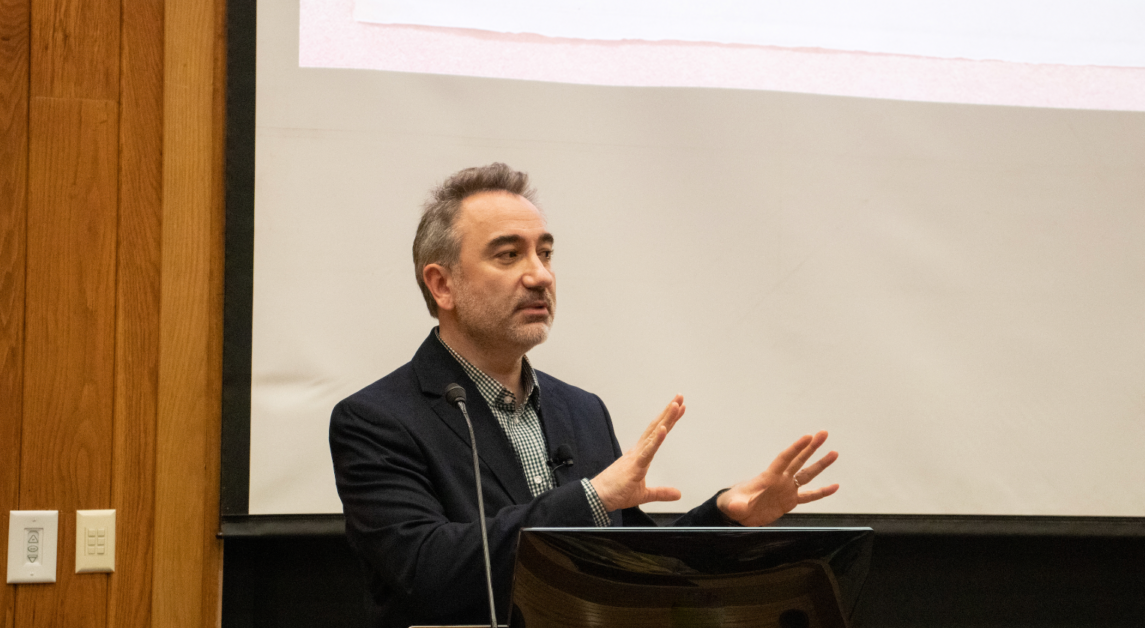“We need to be able to look at the law, see its context, and realize that there are other ideas out there,” said Akyol, a Turkish journalist, author, and senior fellow at the Cato Institute’s Center for Global Liberty and Prosperity.
Akyol spoke on Islamic modernity and jurisprudence in his lecture, titled “An Islamic Case for Freedom and Tolerance,” on Mar. 16.
Akyol said that apostasy and blasphemy in Islam need to be rethought through a modern perspective rather than relying on medieval interpretations.
“There is no basis in the Quran for apostasy or blasphemy laws,” Akyol said. “Quite the contrary, the Quran has some verses that support religious freedom.”
According to Akyol, certain Muslim-majority countries today justify apostasy laws by adding words to the Quran verse of Baqarah 256—which says, “There shall be no compulsion in religion.”
“But this is how they do it in Malaysia [and other countries]: ‘there shall be no compulsion in religion in becoming a Muslim,’” Akyol said. “So that is not in the verse itself–they’re adding those few words in there. A lot of these differences, when you put those words, it means you can enter the religion but you cannot leave it.”
According to Akyol, although coercion is not mentioned in the Quran, nations like Malaysia and Saudi Arabia reinterpret verses to implement apostasy laws, punishing anyone leaving Islam.
“The idea of no coercion, which is there in the Quran, doesn’t go well with some of the interpretations of Islam out there in the world,” Akyol said. “And of course, it’s not just about the Quran—how we ended up here is an interpretation of Islam that is illiberal, which is the issue that I’m working on for many years.”
Akyol also discussed the history of religious tolerance in Islam, which he said dates back to the Ottoman Empire.
Although Ottoman Muslims conquered large lands, Akyol said they did not force Jews and Christians to convert to Islam. According to Akyol, Sephardic Jews who fled Catholic Spain in the 15th century found a home in the Ottoman Empire.
“It was amazing that they didn’t force them to convert … that’s why repeatedly Jews fled from Europe to the lands of Islam because they found more religious freedom there,” he said.
A modern Islamic religious enlightenment is needed, according to Akyol. Instead of reflecting on past philosophers like John Locke, Islam should look in different places to seek similar principles.
“What we need is our own sources for bringing that sort of understanding,” Akyol said. “And what is interesting is that Islam already had its enlightenment for its time … Islam had a time of this engagement with other cultures, this engagement of universality with humane ideas around the world, and it already took place in the early centuries of Islam.”
According to Akyol, some ideas from this previous revolution can aid in the development of a modern religious enlightenment, including the writings of Ibn Rushd—a Muslim philosopher from the 12th century.
“What [Rushd] says is basically, there’s something called natural law and human nature,” he said. “This has to be studied separately—and it and the written laws, in this case the discussion in the Shariah, have to be used together. In fact, religious law can be reinterpreted if there is conflict between the two.”
Akyol said this mechanism can aid in this Islamic enlightenment and enable a push toward a liberal interpretation of Islam today.
Ahura Shadfar, an attendee at the event and MCAS ’24, said Akyol helped changed his perspective on modernity in Islam.
“I thought something that was really interesting was how he described Islam as modern in an Islamic sense not in a Western sense and the idea that they would be creating their own modernity from their own culture, background, and experiences,” Shadfar said.
David DiPasquale, the associate director and director of graduate studies of the Islamic civilization and societies program at BC, said he found Akyol’s professional perspective very insightful.
“I thought it was a wonderful opportunity to have someone of his prominence visit the Boston College community,” DiPasquale said.
Akyol asked the audience to reflect on the essence of religion in the context of Islamic apostasy laws still in place around the world.
“Let’s understand that religion is a matter of persuasion and sincere belief—it’s not something you can police,” Akyol said.
Featured Image by Vikrum Singh / Heights Editor













